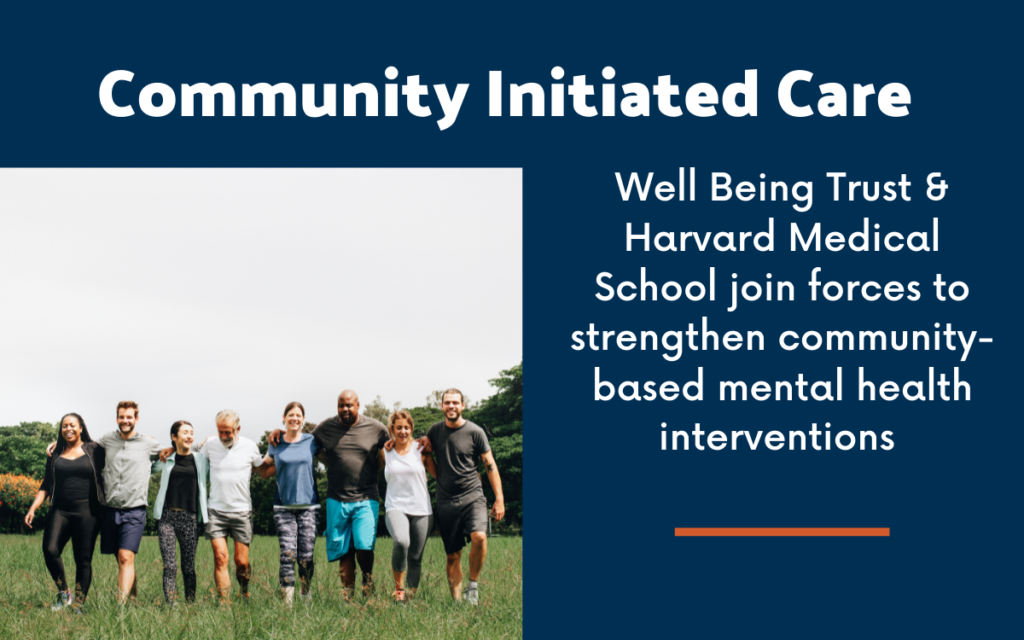Well Being Trust and Harvard Medical School Join Forces to Scale up and Strengthen Community-Based Mental Health Interventions
Key focus includes building mental health workforce in underserved communities
Oakland, Calif. – April 28, 2021 – Finding access to mental health services was difficult even before the coronavirus pandemic, and the current mental health workforce in the U.S. is not large enough or distributed evenly to meet the nation’s current or future needs.
In addition to the predicted workforce shortages for mental health and addiction professionals – including psychiatrists, psychologists and addiction counselors – the fragmented mental health system in the U.S. has tragically resulted in barriers to receiving quality mental health care. Chief among those barriers include issues of coverage and availability. Consider these statistics:
- 50 percent of people drive more than one-hour to mental health treatment locations;
- 33 percent of individuals who seek care wait more than a week to access a mental health service;
- 50 percent of U.S. counties have no psychiatrist;
- Only 10 percent of individuals with an identified substance use disorder receive care.
Furthermore, these barriers are often more widespread in communities of color, particularly in the Black community. And access to care is very limited in rural communities.
To address these challenges, Well Being Trust is working with Harvard Medical School to develop a national plan for scaling up community-based models of care that enable and empower individuals in communities to learn how to respond to mental health and addiction.
The goal of this project, which kicked off in early 2021, is to promote population mental health and well-being, reduce historic and emerging disparities, prevent mental health issues through scaling up evidence-based interventions, and build a new type of mental health workforce in communities throughout the United States.
“Our nation’s fragmented health system has created massive barriers for people who have mental health or addiction needs. Not having enough workforce is often blamed as part of that problem; however, we believe this is the wrong focus – it’s not about how many but where are they, who are they, and what are they doing,” said Benjamin Miller, PsyD, Chief Strategy Officer, Well Being Trust, a national foundation dedicated to addressing the most critical mental health challenges facing America.
“We recognize that any solution to solve our mental health workforce crisis does not only involve having more clinicians, but also broadening how we think about our workforce to allow for more timely interventions in the places people are showing up with mental health needs – mainly their communities e.g., their homes, barber shops and salons, and houses of worship.”
The work builds off the robust literature on task sharing – where low-intensity, evidence-based interventions are taught to the community as a first line of defense.
“Strengthening the base of the pyramid of care offers a highly, cost-effective option to reduce the incidence and impact of mental health issues through a combination of prevention and early intervention strategies,” said Vikram Patel, Ph.D., M.B., B.S., The Pershing Square Professor of Global Health, Harvard Medical School, and principal investigator for the project.
A reformed mental health system would not only include integrating mental health and addiction services into primary care and community-based health care, but it would also enable and empower individuals to learn how to respond to mental health and addiction issues.”
Miller added, “To date there has not been a national plan for scaling up these robust community-led and community-based interventions for mental health. Our work will be to create a plan to address the mental health workforce shortage by redistributing the current workforce and reserving specialty care for individuals with more complex needs, providing multiple entry points to mental health and addiction care, and empowering community members with skills on tackling mental health. We plan to start working in select communities with this plan toward the end of 2021.”
Learn more at wellbeingtrust.org.
About Well Being Trust
Well Being Trust is a national foundation dedicated to advancing the mental, social, and spiritual health of the nation. Created to include participation from organizations across sectors and perspectives, Well Being Trust is committed to innovating and addressing the most critical mental health challenges facing America, and to transforming individual and community well-being. For more information, visit wellbeingtrust.org.
MEDIA CONTACT:
Amy Shields, MA, Director of Communications
Amy@wellbeingtrust.org
214-208-7942






